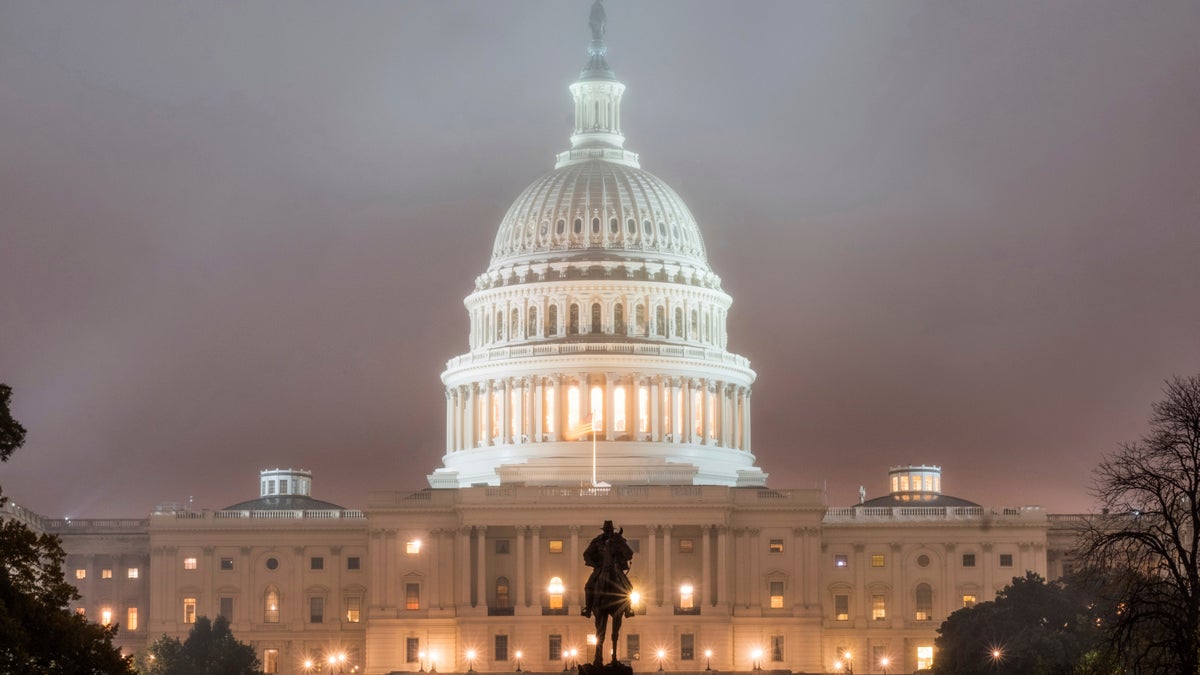
FILE -- Capitol Building in Washingto. (AP Photo/J. David Ake, File)
Imprisoning convicted criminals for longer and longer periods sounds like an appealing and commonsense proposal to many people. After all, when lawbreakers are locked up they can’t commit more crimes and law-abiding citizens are safer. Right? Actually, wrong.
Most prisoners eventually get released. According to the Sentencing Project, more than 50,000 prisoners at the state and federal level are serving sentences of life without parole. But the U.S. Justice Department said that in 2016 there were nearly 2.2 million inmates in state and federal prisons and local jails. The vast majority of these prisoners will be released at some point in their lives.
So it’s important to not just lock criminals up like merchandise in a warehouse. We need to prepare them for re-entry into society by giving them educational, vocational and life-coping skills in prison so they don’t return to a life of crime and wind up back behind bars. Prisons are called “correctional facilities” because the goal is to correct the behavior that sent people there.
In addition to making sense and serving the needs of justice, rehabilitating prisoners and releasing them when they are ready can save taxpayers money. In 2012 (the most recent year for which statistics are available) it cost nearly $81 billion to feed and house prisoners at all levels of government.
The simple truth is that America is locking up too many people, for too long, and spending too much money on them. Certainly, dangerous violent felons need to be locked up for many years, and in some cases for the rest of their lives. But many nonviolent offenders – including those convicted of violating drug laws – are locked up far longer than necessary or justified.
The Trump administration realizes that something is clearly going wrong today in the American criminal justice and incarceration system. That’s why the president is supporting legislation passed by the U.S. House of Representatives and now before the Senate called the First Step Act, which would bring needed reforms to the federal prison system.
If these reforms are adopted in federal prisons, supporters hope states will adopt similar reforms affecting their much larger total prison population.
Unfortunately, the First Step Act is stuck in the Senate because Senate Majority Leader Mitch McConnell, R-Ky., is refusing to bring it to a vote due to division among Republican senators on whether to support the bill. The bill would likely pass in the full Senate because it enjoys widespread support among Democrats, in addition to some Republicans.
The First Step Act would:
- Lower some mandatory minimum federal prison sentences, giving judges more discretion to hand down appropriate sentences.
- Reduce the disparity in sentences between crack and powder cocaine.
- Enable well-behaved federal prison inmates to earn more “good time credits” that would allow them to reduce their sentences by up to 54 days per year.
- Allow prisoners participating in more educational and rehabilitation programs to be released early to halfway houses or home confinement. These programs are designed to help prisoners qualify for jobs once released so they stay out of trouble and don’t return to prison.
- Improve conditions for prisoners, such as requiring that prisoners be placed closer to their families and banning the shackling of women during childbirth.
There are supporters and opponents of the legislation in both parties.
Republicans who support the First Step Act recognize that the current system of “just lock ‘em up” is producing nothing but jammed prisons and high recidivism rates.
Democrats who support the legislation acknowledge that while it does not address pre-incarceration reform and does not include the much larger state prison systems, it is a “first step.”
Then there are those who don’t support the First Step Act and are coming at this from their reflexive oppositional team positions.
Democratic opponents are easy to describe and even easier to intellectually dismiss. They object because the legislation isn’t everything they could have ever imagined and because President Trump is behind it.
There is no way for me or anyone else to reach those folks intent on “resisting” everything the president supports. So I would like to address Republicans in the Senate and skeptical conservative citizens.
It’s a fact that the First Step Act represents a chance to change the status quo and replace political talk with political action. Poor communities in general, and minority communities in particular, are disproportionality impacted by what goes on inside our criminal justice system.
These are the people caught in cycles of despair, hopelessness and limited choices. The First Step Act can break these vicious cycles.
This is not about some abstract notion of forgiveness. This is chance to pragmatically help people who might have made a mistake, want to pursue a second chance, and become genuinely deserving of receiving that chance.
While great controversy surrounds ideas of sentencing reform (which also needs to be addressed), this legislation also reforms the exit from prisons. Some people being released from prison today are so ill-prepared and unwelcome back into the general population that they commit crimes just to return to prison.
With President Trump leading the way in a bipartisan effort, it is time for senators to follow the lead of their colleagues in the House and pass the First Step Act in this year’s congressional session. The legislation would help prisoners turn their lives around, rejoin society and become law-abiding citizens. And by serving as a model for state legislation, the bill could save taxpayers billions of dollars now spent locking up men and women who pose no danger to their communities.








































